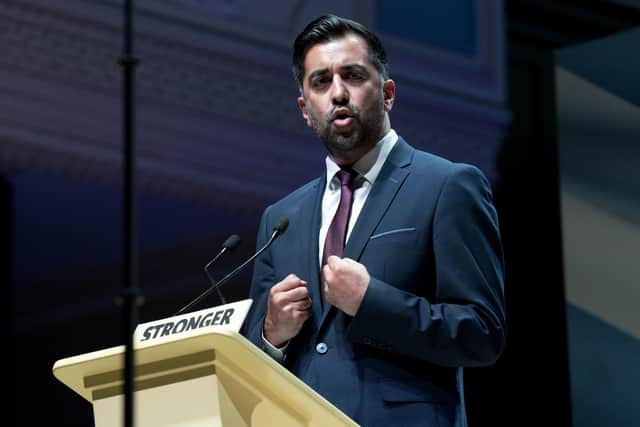Humza Yousaf and SNP's independence strategy: Campaign to boost support more important than seeking referendum
and live on Freeview channel 276
Independence isn't coming any time soon. SNP members know that as well as anyone, but that doesn't stop them believing in it or arguing for it and trying to plot a course to achieve it.
After the flat refusal by the Westminster government even to discuss another independence referendum and the Supreme Court ruling that Holyrood has no power to stage its own vote, SNP leader Humza Yousaf set out his preferred strategy at a one-day "independence convention" in Dundee on Saturday. In place of Nicola Sturgeon’s plan to treat the next UK general election as a “de facto referendum”, where winning more than 50 per cent of the votes would be taken as a mandate to start negotiations for independence, he set a lower bar.
Advertisement
Hide AdAdvertisement
Hide AdThe detail of the strategy was not immediately clear from his speech. He said "page one, line one" of the SNP's manifesto would read: "Vote SNP for Scotland to become an independent country." If the SNP won the election it would seek negotiations with the UK government on “how we give democratic effect to Scotland becoming an independent nation.” And he quickly added that a referendum remained the party’s “Plan A”.


When he was quizzed by journalists afterwards it became clearer: winning the election meant winning a majority of seats, not a majority of votes; and “giving democratic effect” meant a referendum rather than expecting to negotiate independence. At first sight it seems exactly the same as the strategy the party has had ever since the 2014 referendum.
But Mr Yousaf insists there are several new elements. First, he says, the party has never been so explicit as to open its manifesto with the clear declaration that a vote for the SNP is a vote for independence. Then, he goes on, a general election win would be a mandate not just to seek a fresh referendum, but also for the Scottish Government to lay the foundations of an independent state: drafting a withdrawal agreement, including the division of assets and areas of continuing co-operation; drawing up an interim constitution; and appointing a special envoy to Brussels to pursue the prospect of an independent Scotland rejoining the European Union.
The obvious and tricky question is: what happens when the UK government still says No to another referendum? Mr Yousaf told the BBC’s Sunday Show: "I’m under no illusion that Westminster will continue, and does continue, to deny us.” He said that was why the SNP must never stop growing support for independence to make it “the consistent will of the people of Scotland”. He has promised a summer campaign on independence, culminating in a rally in Edinburgh on September 2.
Advertisement
Hide AdAdvertisement
Hide AdAnd that perhaps is the most crucial part of his plan. With SNP support falling, the forthcoming general election, due within the next 18 months, does not seem the most promising vehicle for claiming any mandate for the independence cause. Labour is well ahead in UK polls and, whatever the SNP says in its manifesto, the election is going to be all about getting rid of the Tories.
But support for independence remains around 50 per cent and even Scottish Secretary Alister Jack has talked of another referendum if it reached a consistent 60 per cent. It may take time, but the opportunity is there.
Comment Guidelines
National World encourages reader discussion on our stories. User feedback, insights and back-and-forth exchanges add a rich layer of context to reporting. Please review our Community Guidelines before commenting.